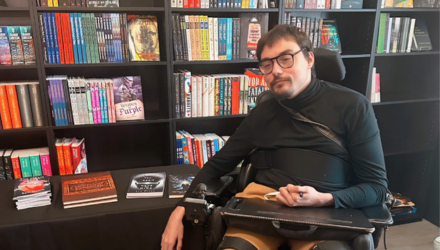Name: Sam Dupre
Age: 30
Where do you call home? Southwest Louisiana is my home sweet home.
Who do you live with? I live with my father, in his house.
How long has it been since you experienced the first symptoms of FA? What is the situation now? I started experiencing the symptoms of FA at the age of 5, it was another 5 years before I was diagnosed, at the age of 15 I started using a wheelchair. Now I use a power wheelchair.
Are there any others with FA in your family? I have a younger sister Sydni Gibson-Dupre, who also lives with Friedreich’s ataxia.
How has FA affected your friendships and relationships? Were people supportive? FA has undeniably impacted my relationships; I have lost so many due to the condition. However, the friendships that I have formed on this journey, well, I would not trade them for anything in the world!
What do you like to do to stay active and what type of exercises work for you to stay strong? I work out and stretch on a regular basis, swimming is my favorite way to stay invigorated.
What is a favorite motivational quote of yours? ‘The struggle you’re in today is developing the strength you need for tomorrow.’ Robert Tew
What is a piece of advice that someone with FA has given you that encourages and inspires you? That some days are going to be tough and that’s okay because tomorrow will be better.
What is the best advice you could give to a person who has been newly diagnosed with FA? My advice would be to relentlessly chase after your dreams. FA makes it harder but also so much more rewarding.
How did you decide to write a book, what inspired you? What is the title of the book? My new book is called ‘The Heart of FA’ it is a collection of 7 stories; told from the perspective of a child diagnosed with FA, an adult, a mother and a father seeing their child diagnosed with the condition, a physical therapist and a neurologist who treat the effects of the disease. The story highlights the declining mobility we face as well as the societal perceptions or lack thereof. I based these stories off of personal experiences, they are written sort of like a diary, although some of it is imagined or based on the experience of others. Friedreich’s Ataxia has its own heartbeat, and I listened to it, and I did my best to put it in words.
Writing has been a passion of mine for a very long time, it was my escape from a reality that just did not make sense to me. The Heart of FA is my 6th published work, and it is by far, my most personal. I wanted to tell the world about the challenges that we face and how we handle them.
Can we hear the titles of your earlier works and are they available to order? My first book, a memoir called ‘Seek A Miracle,’ tells my story. My favorite thing about that book is the title/cover. I designed it back when I was in college 10 years ago and never knew why until I wrote the book in 2018. My second book was a cookbook of recipes from my dad that I enjoy; it is called ‘The Cajun-Country Cookbook.’ His recipes blend the two styles together to make some amazing meals. My third book is a children’s book called ‘Sam Goes to School,’ which is just a cute little story about a kid navigating elementary school in a wheelchair, making friends, going on adventures, and such. Next is ‘You Can’t Have My Mind,’ which is a book of 22 short stories that span genres—everything from horror to nonfiction. With that one, I wanted to show that Friedreich’s ataxia may have taken my physical strength, but it cannot touch my mental ability. ‘House of the Gods’ follows the Norse gods as they move into a mansion in Miami; it is a comedy, and I love Norse mythology. Then there’s ‘The Heart of FA.’ I wanted to show that this disease does not just affect one person individually, but everyone involved—from friends to doctors and therapists.
All my books are available on Amazon just by searching my name. Also, I am excited to say that they were recently bought by a local bookstore in my area, Lake Charles, Louisiana. I do not plan to quit writing anytime soon!
Are the healthcare providers in your town familiar with FA? Is there support available from the healthcare system? I would say more so now, than when I was first diagnosed. We had to figure it out for ourselves. Now we have a strong support system.
What’s a typical day look like for you? I wake up early, before daylight, have coffee and read for a while. I exercise, or do some stretches, then I write for the rest of the day.
What is your favorite part of the day? Watching the sunrise in the morning time!
Interview by
Dragana Obadić
